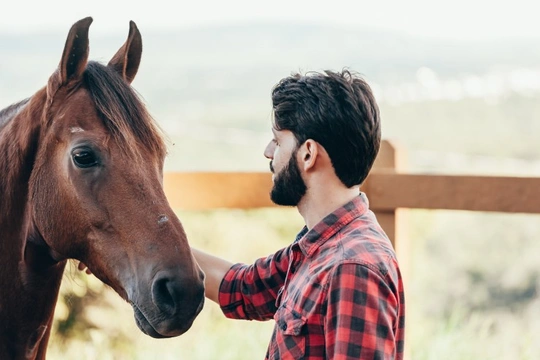
Important ground and stable etiquette for your horse
If you are an inexperienced horse owner, there are some basic principles that you should teach your horse from the onset, which will make yours and the horse’s life easier. It is no different to teaching a dog or cat some ground rules in terms of behaviour – ‘a what to do and what not to do’ situation! Happiness and safety are paramount when owning an animal such as a horse – like most other pets, they will impose their will on you if you don’t take control in the early stages, but we are talking about a much bigger and weightier animal to deal with.
Touching
No matter what part of your horse you touch, whether tail, ears etc. or underbelly, your horse should allow you to do so willingly, without pulling away or treading on your feet. Your horse by nature will have a lot of sensitive spots, but at some stage they may be injured or need more intensive grooming, so they must be ready to let you do this without too much reaction.
Farriers will visit approximately every two months to keep up with hoof care, so you should be able to teach your horse to stand patiently and let this happen.
Responding to call
When you turn your horse out for the day, there is nothing worse than them totally ignoring your call or running off as soon as you approach them, particularly if you are bringing them into stable for the night and you are beginning to freeze to death out in the cold. Equally so if a vet or farrier has turned up for an appointment and they charge by the hour you could be in for an unexpectedly large bill!
Walking and Leading
Your horse should always walk quietly and peacefully in hand, preferably beside you or even just slightly behind, but still aware of where you are. You should never allow them to push into you or try to drag you in another direction, they must follow your lead and walk willingly. If you allow them to get away with this action, you are setting yourself up for a lot of trouble. Any instructions from you should be immediately carried out without resistance.
Waiting
Another important factor of ground etiquette from your horse is the command you give them to ‘wait’, which must be done firmly and without indecision. You may use a different word, whichever one suits you. They should obey this unfailingly, as a horse that won’t wait, could put you in a dangerous position (let alone others around you). Never allow them to take the lead through a gate or other entry point such as a stable door, particularly when you are trying to get feed ready. Patience will indeed be a virtue, and you will not end up pinned against a stable wall while your horse digs into breakfast!
Administering Oral Medications
This is probably the hardest of all to achieve, as your horse initially will hate any strange taste being put into his mouth, such as a wormer or other medicine that will taste foul. Gentle persistence will hopefully work as this is an important factor of caring for your horse and not having to call the vet out every time you need to administer medication (certainly hard on your pocket as well). Worming is an essential and regular treatment required to ensure that parasites are under control and your horse is happy and healthy.
Grooming and tacking up
As these are things you will do daily, you must teach your horse to learn patience when tied. This could be because you want to groom him, clean out the stable, or tack up ready for a ride. Your horse should wait happily tied up for you to finish your chores whether it’s a hitching post outside the local pub, on your trailer or outside you stable! No fussing and no trying to free himself – but they should be adequately watered for obvious reasons.
Box and Trailer Behaviour
Even if you have no intention of competing with your horse or any other reason to leave your normal stabling, it is useful for your horse to learn to board either of these calmly and quietly. There could be instances where your horse is ill and needs veterinary treatment away from the stables, such as surgery. If your horse has been injured and needs hydrotherapy during recuperation, this could be another reason that you weren’t expecting. There are a multitude of emergencies where your horse may need to be transported out of his comfort zone, which could include fire or flooding at your stable block – you cannot leave your horse there as panic will occur and they will be likely to bolt, which is far worse and extremely dangerous to other people and cars around the roads.
Of course, if you decide for whatever reasons to sell your horse, it is important that they can be transported easily and safely. It is a sad enough occasion when selling which can be made worse by the reluctance of your pet to leave in a box or trailer, so don’t prolong the agony by taking a long time to load them.
By teaching your horse all these basic rules, you will be able to enjoy them far more, as opposed to worrying just what mischief they will be getting up to next. It is safer for you and for those around you.



